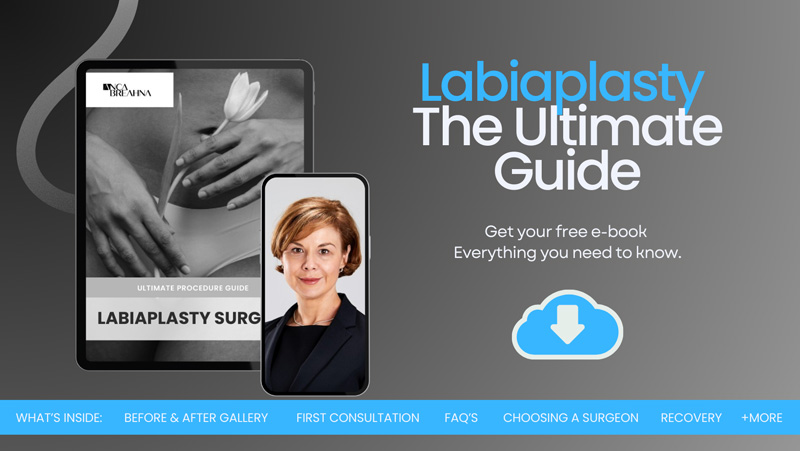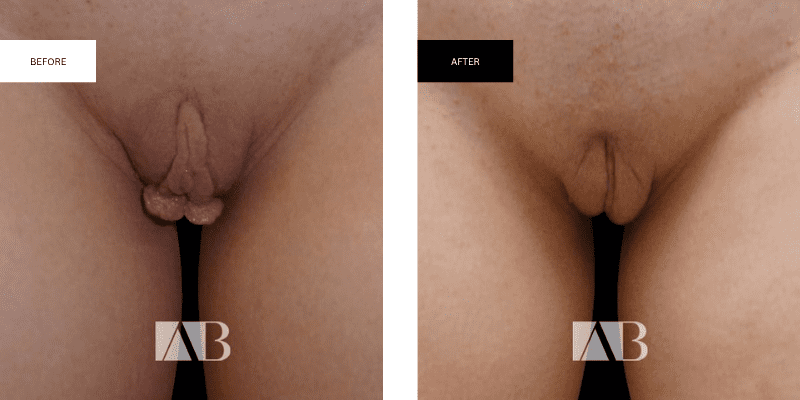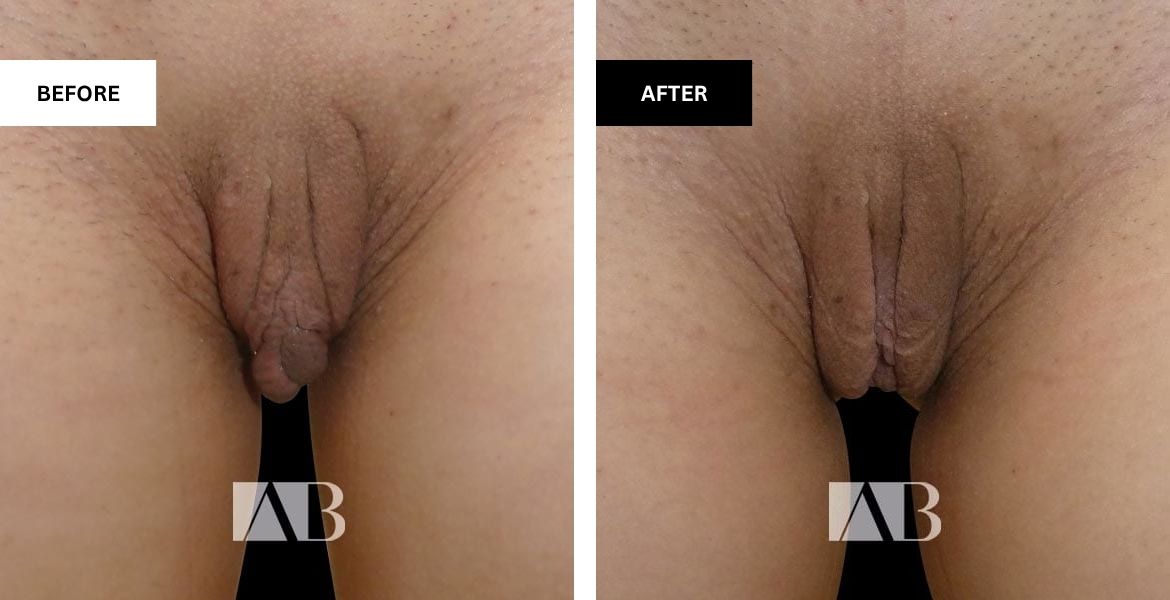
- Take our Plastic Surgery Quiz to find out if you'd be a good candidate for cosmetic surgery.
- Why the Labia May Change After Childbirth
- Contributing factors include:
- Common Postpartum Labial Concerns
- ✦ Aesthetic Differences
- ✦ Functional Discomfort
- ✦ Emotional and Psychological Effects
- Download the Labiaplasty Guide
- Is Labial Stretching After Childbirth Normal?
- What Can Be Done? Treatment Options in Chester
- ✦ What Is Labiaplasty?
- ✦ Procedure and Recovery
- ✦ Alternative Options
- Labiaplasty Before and After Photos
- Why Choose Miss Anca Breahna?
- Women across Chester and beyond choose Miss Anca Breahna because:
- What to Expect from Your Consultation
- FAQs About Post-Childbirth Labial Changes
- What to do now: You Deserve to Feel Comfortable Again
- Take the First Step Today
- Further Reading about Labia Stretching with Childbirth with Consultant Plastic Surgeon Anca Breahna
Childbirth is a journey that forever changes a woman’s body, mind, and spirit. But while many physical changes are celebrated, others—like those affecting the labia—are often met with silence. It’s not uncommon to wonder: “Has my labia stretched with childbirth?”
If this concern is affecting your comfort or confidence, know that you’re not alone. At her highly respected clinic in Chester, Miss Anca Breahna, Consultant Plastic, Reconstructive and Aesthetic Surgeon, offers expert-led, compassionate solutions for women experiencing these changes.
Take our Plastic Surgery Quiz to find out if you’d be a good candidate for cosmetic surgery.
Why the Labia May Change After Childbirth
Vaginal birth places intense strain on the body, especially around the vaginal opening. This can stretch the surrounding soft tissue structures—including the labia minora and labia majora—sometimes beyond their ability to return to their original state.
Contributing factors include:
- Mechanical strain during childbirth: The natural expansion of the vaginal canal can cause the inner and outer labia to stretch significantly. This is especially true during prolonged or complicated labours.
- Tears or incisions (episiotomy): These may affect the surrounding labial tissues. Even when healed, they can result in uneven contours or noticeable scarring.
- Multiple deliveries: Each subsequent birth can place additional strain on tissues that may not have fully recovered from previous pregnancies, increasing the likelihood of long-term changes.
- Hormonal shifts: Postnatal hormonal fluctuations—particularly the drop in oestrogen—can cause the skin to lose elasticity, making labial tissues more susceptible to permanent stretching.
Common Postpartum Labial Concerns
Each woman’s experience is unique, but the following issues are commonly reported by patients after childbirth:
✦ Aesthetic Differences
- Elongated labia minora: The inner lips may protrude noticeably past the outer lips, sometimes visible in swimwear or tight-fitting underwear.
- Wrinkled or thinned appearance: The labia majora may appear deflated or sagging due to volume loss or changes in collagen.
- Asymmetry: One side of the labia may hang lower or appear darker than the other, creating a visual imbalance that some women find distressing.
✦ Functional Discomfort
- Chafing or friction: Excess tissue may rub against clothing, causing irritation during everyday movements or exercise.
- Pain during intimacy: The tugging or pinching of elongated labial tissue during sexual activity can lead to discomfort or even avoidance of intimacy.
- Difficulty with hygiene: Larger labial folds may trap moisture or bacteria, potentially leading to discomfort or recurrent infections.
✦ Emotional and Psychological Effects
- Self-consciousness: Changes in labial appearance can affect how women feel during intimacy, leading to anxiety or reduced libido.
- Body image concerns: Some women feel their postnatal genital appearance doesn’t align with their self-image, impacting confidence.
- Loss of femininity: For a few, the visual changes may feel symbolic of having lost part of their pre-baby identity.
These issues are not superficial—they can deeply impact daily life, personal comfort, and mental wellbeing. At her Chester-based clinic, Miss Anca Breahna offers a judgement-free space to talk openly about these concerns.
Download the Labiaplasty Guide

Is Labial Stretching After Childbirth Normal?
Absolutely. The majority of women experience some degree of labial change following natural childbirth. It’s part of the body’s remarkable adaptability.
However, “normal” doesn’t mean you must simply live with it. If your labial changes are causing:
- Persistent discomfort,
- Emotional distress,
- Difficulty with activities or intimacy,
…it is perfectly reasonable – and responsible – to seek guidance from a qualified professional.
At her clinic in Chester, Miss Anca Breahna, Consultant Plastic, Reconstructive and Aesthetic Surgeon, helps women understand their bodies and explore their options with empathy and medical precision.
What Can Be Done? Treatment Options in Chester
The most effective solution for stretched or uncomfortable labia is a surgical procedure known as labiaplasty. This is designed to reduce the size and reshape the labia minora for both aesthetic and functional improvement.
✦ What Is Labiaplasty?
Labiaplasty is a bespoke procedure tailored to your individual anatomy. It aims to:
- Remove or reshape excess tissue of the labia minora to reduce discomfort and improve appearance.
- Improve symmetry between the left and right sides of the labia.
- Enhance comfort by eliminating rubbing, pulling, or chafing during movement or intercourse.
- Boost confidence, helping women feel more at ease in their bodies—whether wearing fitted clothing, engaging in intimacy, or simply moving freely.
✦ Procedure and Recovery
- Anaesthesia options: Most procedures are performed under local anaesthetic, but general anaesthetic is also available depending on preference and case complexity.
- Duration: The surgery usually takes 1–2 hours and is carried out as a day-case procedure, with no overnight stay required.
- Healing time: Most patients return to light activity within 5–7 days. Full recovery and return to exercise and intercourse typically occur within 4–6 weeks.
- Scarring: Minimal and carefully hidden within the natural folds of the labia.
- Postoperative care: Patients receive a personalised recovery plan and follow-up support to ensure comfort and proper healing.
✦ Alternative Options
While surgery is the definitive treatment, Miss Anca Breahna may also advise non-surgical support such as pelvic floor therapy or vaginal rejuvenation technologies if surgery isn’t immediately preferred.
Labiaplasty Before and After Photos
Why Choose Miss Anca Breahna?
The decision to pursue labiaplasty—or even just to enquire—is deeply personal. Choosing a surgeon with the right blend of technical excellence, understanding, and trustworthiness is essential.
Women across Chester and beyond choose Miss Anca Breahna because:
- Elite qualifications: A Consultant Plastic, Reconstructive and Aesthetic Surgeon, Miss Breahna is highly trained in both cosmetic and functional procedures, with expertise refined over two decades.
- Female perspective: As one of the few female plastic surgeons in Chester, she offers unique empathy and insight into women’s intimate concerns.
- Reputation for excellence: Trusted by both NHS and private patients for consistent, natural-looking results.
- Premium facilities: Operating out of Nuffield Health The Grosvenor Hospital in Chester and ASET Hospital in Liverpool, she provides treatment in modern, discreet, patient-centred environments.
- Patient-centred ethos: From consultation through to aftercare, every decision is guided by what’s best for you. You’ll never be rushed, and your voice will always be heard.
What to Expect from Your Consultation
Booking a consultation with Miss Anca Breahna is your opportunity to explore your concerns, ask questions, and get clarity—all without pressure.
During the consultation, you can expect:
- Time to talk: You’ll be given a private, respectful environment to express your worries and desires.
- Thorough evaluation: A gentle examination may be conducted to understand your anatomy and suggest appropriate options.
- Expert advice: You’ll receive clear, realistic information about what’s possible—from aesthetic results to recovery expectations.
- Full transparency: Risks, benefits, costs, and timelines will be discussed openly so you can make an informed choice.
- Tailored planning: If you choose to proceed, your treatment plan will be completely individualised to your needs, lifestyle, and preferences.
There is no obligation—only support, clarity, and expert guidance.
FAQs About Post-Childbirth Labial Changes
Will anyone be able to tell I’ve had labiaplasty?
No. When performed by an experienced surgeon like Miss Anca Breahna, labiaplasty results are subtle and natural-looking. The incisions are placed carefully within the natural contours of the labia, making them virtually undetectable once healed—even to a medical professional. Most patients feel more confident in their appearance, not more scrutinised.
My labia changed years ago after childbirth—am I too late to consider surgery?
Absolutely not. There is no time limit on seeking help. Many women don’t feel ready to explore treatment until years after their last pregnancy. Whether your child is a newborn or an adult, your comfort and body confidence remain valid and important. Patients in their 40s, 50s, and beyond often choose to address labial concerns later in life.
Can stretched labia cause issues during exercise or sports?
Yes, they can. Women often report discomfort during running, cycling, or other physical activities due to friction, pressure, or tugging. Some even avoid certain exercises altogether. Labiaplasty can relieve these physical barriers, allowing women to move more freely and enjoy their workouts again without irritation or self-consciousness.
Will labiaplasty affect sensation or sexual function?
When performed with care, labiaplasty does not negatively affect sexual function or sensation. In fact, many women report an improvement due to the reduction in discomfort, improved confidence, and less interference from excess tissue. The clitoris and other sensitive areas are not altered during the procedure, maintaining natural sensitivity.
I’ve had a vaginal tear during delivery—can I still have labiaplasty?
Yes. Many women who’ve experienced perineal or labial tears during childbirth are still suitable candidates for labiaplasty. In fact, those with scar tissue or uneven healing often benefit significantly from corrective reshaping. A personalised consultation with Miss Anca Breahna will help assess suitability and develop a safe treatment plan.
Can childbirth cause changes to only one side of the labia?
Yes, and this is more common than you might think. Due to the position of the baby, delivery angle, or natural anatomical differences, labial asymmetry can develop or become more pronounced after childbirth. Labiaplasty is particularly effective in correcting this, restoring balance and comfort with great precision.
Will labiaplasty change how I feel about my body?
Many women describe a powerful sense of renewed confidence and comfort following labiaplasty. While surgery is never a cure-all for emotional wellbeing, resolving a source of daily discomfort or insecurity often has a ripple effect—boosting self-esteem, comfort in clothing, intimacy, and body image overall. It’s about restoring harmony between how you feel and how you see yourself.
Medical References
- Perineal techniques during the second stage of labour for reducing perineal trauma. Cochrane Database of Systematic Reviews – https://pmc.ncbi.nlm.nih.gov/articles/PMC6481402/
- Perineal care (NHS) – https://www.somersetft.nhs.uk/maternity-new/maternity/after-your-babys-birth/for-you/perineal-care/
- Advancing care for childbirth-related pelvic floor disorders – Mayo Clinic – https://www.mayoclinic.org/medical-professionals/physical-medicine-rehabilitation/news/advancing-care-for-childbirth-related-pelvic-floor-disorders/mqc-20567811
- Perineal Massage or Warm Compress to Decrease Perineal Trauma in the Second Stage of Labor – Spark, Bethel University – https://spark.bethel.edu/cgi/viewcontent.cgi?article=1132&context=etd
- Reducing perineal trauma through perineal massage with vaseline in second stage of labor – Science.gov – https://www.science.gov/topicpages/p/perineal+reapir+performed
- Your guide to perineal massage – East Lancashire Hospitals NHS Trust – https://elht.nhs.uk/services/maternity-and-newborn-services/perinatal-pelvic-health-physiotherapy-service-pphs/your-guide-perineal-massage
- On the biomechanics of vaginal birth and common sequelae – Annual Review of Biomedical Engineering – https://www.annualreviews.org/doi/10.1146/annurev-bioeng-061008-124636
What to do now: You Deserve to Feel Comfortable Again
Post-childbirth changes can be emotional, but they don’t have to define your confidence or comfort. Whether you are a new mum or many years postpartum, your wellbeing matters.
You do not need to “just live with it.” With support from Miss Anca Breahna, Consultant Plastic, Reconstructive and Aesthetic Surgeon in Chester, you can take control and feel more like you again.
Comfort. Confidence. Choice. It’s time to put your needs first.
Take the First Step Today
Located in Chester, with facilities also available in Liverpool, Miss Anca Breahna provides safe, confidential, and expertly delivered care to women across the North West of England. If you’re ready to explore your options or simply want to have a conversation in a supportive environment, taking that first step is easy.
To arrange a private consultation, you can call directly on 07538 012918, email at contact@ancabreahna.com, or visit the official website to learn more about available treatments and schedule your appointment online.
You deserve to feel confident and comfortable in your body again—when you’re ready, Miss Breahna is here to help.
Further Reading about Labia Stretching with Childbirth with Consultant Plastic Surgeon Anca Breahna
- Read more about Labiaplasty vs Vaginoplasty
- Read more about Scars after Labiaplasty
- Read more about What Are the Trim and Wedge Methods for Labiaplasty Surgery?
- Read more about Exercise after Labiaplasty
- Read more about Recovery after Labiaplasty
- Read more about How to Get Rid of Large Labia – Treatment Options
- Read more about What Is A Labiaplasty Or So Called Designer Vagina?
- Read more about Can My Labia Be Reduced? – About Labia Reduction Surgery



 Ms Anca Breahna, PhD, MSc, FEBOPRAS, FRCS (Plast) is a highly regarded Consultant Plastic Surgeon specialising in the field of Aesthetic and Reconstructive Plastic Surgery. Anca performs a range of
Ms Anca Breahna, PhD, MSc, FEBOPRAS, FRCS (Plast) is a highly regarded Consultant Plastic Surgeon specialising in the field of Aesthetic and Reconstructive Plastic Surgery. Anca performs a range of 